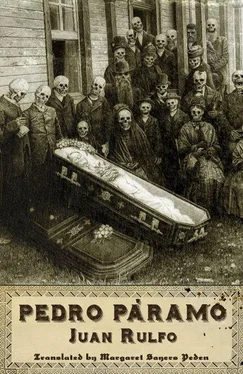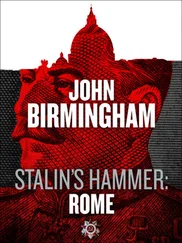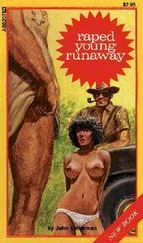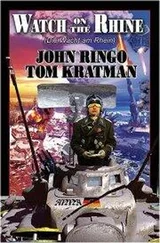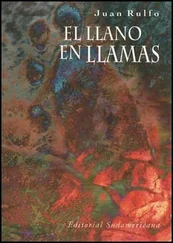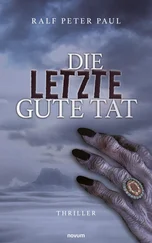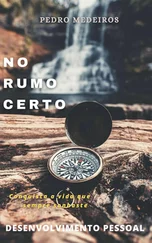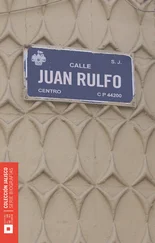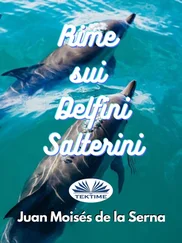“And don’t call me Bartolome! I’m your father!”
Bartolome San Juan, a dead miner. Susana San Juan, daughter of a miner killed in the Andromeda mines. He saw it clearly. “I must go there to die,” he thought. Then he said: “I’ve told him that although you’re a widow, you are still living with your husband — or at least you act as if you are. I’ve tried to discourage him, but his gaze grows hard when I talk to him, and as soon as I mention your name, he closes his eyes. He is, I haven’t a doubt of it, unmitigated evil. That’s who Pedro Paramo is.”
“And who am I?”
“You are my daughter. Mine. The daughter of Bartolome San Juan.”
Ideas began to form in Susana San Juan’s mind, slowly at first; they retreated and then raced so fast she could only say:
“It isn’t true. It isn’t true.”
“This world presses in on us from every side; it scatters fistfuls of our dust across the land and takes bits and pieces of us as if to water the earth with our blood. What did we do? Why have our souls rotted away? Your mother always said that at the very least we could count on God’s mercy. Yet you deny it, Susana. Why do you deny me as your father? Are you mad?”
“Didn’t you know?”
“Are you mad?”
“Of course I am, Bartolome. Didn’t you know?”
You know of course, Fulgor, that she is the most beautiful woman on the face of the earth. I had come to believe I had lost her forever. I don’t want to lose her again. You understand me, Fulgor? You tell her father to go explore his mines. And there… I imagine it wouldn’t be too hard for an old man to disappear in a territory where no one ever ventures. Don’t you agree?”
“Maybe so.”
“We need it to be so. She must be left without family. We’re called on to look after those in need. You agree with that, don’t you?”
“I don’t see any difficulty with that.”
“Then get about it, Fulgor. Get on with it.”
“And what if she finds out?”
“Who’s going to tell her? Let’s see, tell me. Just between the two of us, who’s going to tell her?”
“No one, I guess.”
“Forget the ‘I guess.’ Forget that as of now, and everything’ll work out fine. Remember how much needs to be done at the Andromeda. Send the old man there to keep at it. To come and go as he pleases. But don’t let him get the idea of taking his daughter. We’ll look after her here. His work is there in the mines and his house is here anytime he wants it.
Tell him that, Fulgor.”
“I’d like to say once more that I like the way you do things, patron. You seem to be getting your spirit back.”
Rain is falling on the fields of the valley of Comala. A fine rain, rare in these lands that know only downpours. It is Sunday. The Indians have come down from Apango with their rosaries of I chamomile, their rosemary, their bunches of thyme. They have come without ocote pine, because the wood is wet, and without oak mulch, because it, too, is wet from the long rain. They spread their herbs on the ground beneath the arches of the arcade. And wait.
The rain falls steadily, stippling the puddles.
Rivers of water course among the furrows where the young maize is sprouting. The men have not come to the market today; they are busy breaching the rows so the water will find new channels and not carry off the young crop. They move in groups, navigating the flooded fields beneath the rain, breaking up soft clumps of soil with their spades, firming the shoots with their hands, trying to protect them so they will grow strong.
The Indians wait. They feel this is a ill-fated day. That may be why they are trembling beneath their soaking wet gabanes, their straw capes — not from cold, but fear. They stare at the fine rain and at the sky hoarding its clouds.
No one comes. The village seems uninhabited. A woman asks for a length of darning cotton, and a packet of sugar, and, if it is to be had, a sieve for straining cornmeal gruel. As the morning passes, the gabanes grow heavy with moisture. The Indians talk among themselves, they tell jokes, and laugh. The chamomile leaves glisten with a misting of rain. They think, “If only we’d brought a little pulque, it wouldn’t matter; but the hearts of the magueys are swimming in a sea-of-water. Well, what can you do?”
Beneath her umbrella, Justina Diaz makes her way down the straight road leading from the Media Luna, avoiding the streams of water gushing onto the sidewalks. As she passed the main entrance to the church, she made the sign of the cross. She walked beneath the arches into the plaza. All the Indians turned to watch her. She felt their eyes upon her, as if she were under intense scrutiny. She stopped at the first display of herbs, bought ten centavos worth of rosemary, and then retraced her steps, followed by countless pairs of Indian eyes.
“Everything costs so much this time of year,” she thought as she walked back toward the Media Luna. “This pitiful little bunch of rosemary for ten centavos. It’s barely enough to give off a scent.”
Toward dusk the Indians rolled up their wares. They walked into the rain with their heavy packs on their backs. They stopped by the church to pray to the Virgin, leaving a bunch of thyme as an offering. Then they set off toward Apango, on their way home.
“Another day,” they said. And they walked down the road telling jokes, and laughing.
Justina Diaz went into Susana San Juan’s bedroom and set the rosemary on a small shelf. The closed curtains blocked out the light, so that she saw only shadows in the darkness; she merely guessed at what she was seeing. She supposed that Susana San Juan was asleep; she wished that she did nothing but sleep, and as she was sleeping now, Justina was content. But then she heard a sigh that seemed to come from a far corner of the darkened room.
“Justina!” someone called.
She looked around. She couldn’t see anyone but she felt a hand on her shoulder and a breath against her ear. A secretive voice said, “Go-away, Justina. Bundle up your things, and leave. We don’t need you anymore.”
“She needs me,” she replied, standing straighter. “She’s sick, and she needs me.”
“Not anymore, Justina. I will stay here and take care of her.”
“Is that you, don Bartolome?” But she did not wait for the answer. She screamed a scream that reached the ears of men and women returning from the fields, a cry that caused them to say “That sounded like someone screaming, but it can’t be human.”
The rain deadens sounds. It can be heard when all other sound is stilled, flinging its icy drops, spinning the thread of life.
“What’s the matter, Justina? Why did you scream?” Susana San Juan asked.
“I didn’t scream, Susana. You must have been dreaming.”
“I’ve told you, I never dream. You have no consideration. I scarcely slept a wink. You didn’t put the cat out last night, and it kept me awake.”
“It slept with me, between my legs. It got wet, and I felt sorry for it and let it stay in my bed; but it didn’t make any noise.”
“No, it didn’t make any noise. But it spent the night like a circus cat, leaping from my feet to my head, and meowing softly as if it were hungry.”
“I fed it well, and it never left my bed all night. You’ve been dreaming lies again, Susana.”
“I tell you, it kept startling me all night with its leaping about. Your cat may be very affectionate, but I don’t want it around when I’m sleeping.”
“You’re seeing things, Susana. That’s what it is. When Pedro Paramo comes, I’m going to tell him that I can’t put up with you any longer. I’ll tell him I’m leaving. There are plenty of nice people who will give me work. Not all of them are crazy like you, or enjoy humiliating a person the way you do. Tomorrow morning I’m leaving; I’ll take my cat and leave you in peace.”
Читать дальше
